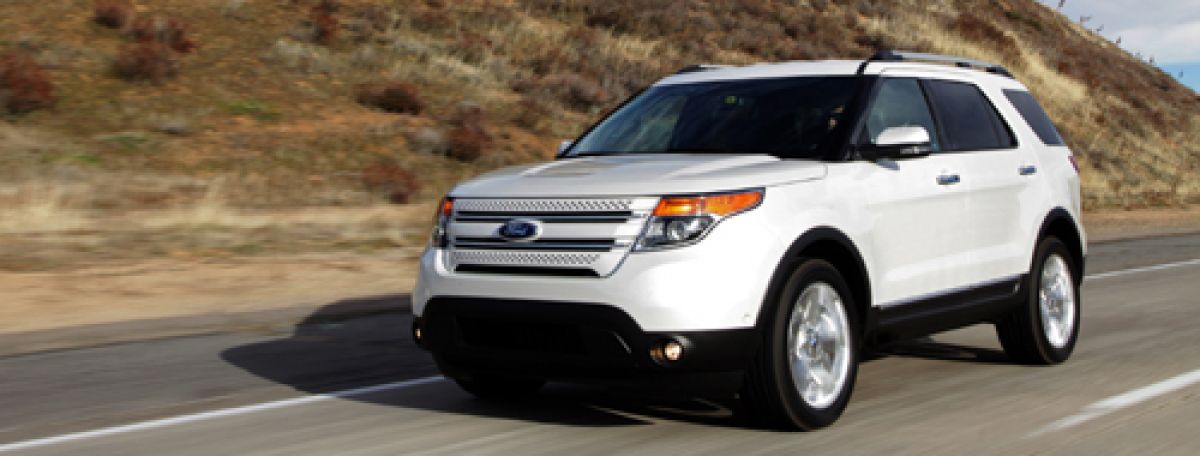The main focus of the study is going to be on how badly Ford did. As the testing group said in its announcement, "The new Explorer, Fiesta, and Focus all had below-average reliability in their first year. As a result, Ford’s overall reliability rank among 28 major car makes slipped from the 10th to the 20th spot this year—the biggest drop for any major nameplate in Consumer Reports 2011 Annual Auto Survey."
Consumer Reports has gone so far as to imply that consumers might want to stay away from any new Ford products built in the 2011 model year. “We have often found that new or revamped models have more problems in their first year than in subsequent model years. Ford’s problems illustrate why we recommend to our subscribers to hold off buying a first-year model,” said David Champion. Sr. Director of Consumer Reports’ Automotive Test Center.
That's a pretty damning statement for the Dearborn, Mich., manufacturer that has been enjoying strong sales with the Explorer. Ford crowed in a release recently that "America’s love affair with the Ford Explorer is stronger than ever with more than 100,000 Explorers sold this year – making it the fastest-growing midsize utility in the nation."
They're not feeling the love at the Connecticut-based testing facility of Consumer Reports to say the least. Consumer Reports said its 2011 reliability study showed, "Ford’s drop can also be attributed to problems with new technologies: the new MyFord Touch infotainment system and the new automated-manual transmission used in the Fiesta and Focus. Lincoln finished above Ford, although the freshened MKX, a cousin of the Edge, suffered from the MyLincoln Touch system."
Want to know how maddening the MyFordTouch system can be? Look no further than this Boston.com video by Craig Fitzgerald that shows how frustrating MyFordTouch is in a real-world application. Rumor has it Ford hates the video, which is why you'll want to watch it.
The two worst manufacturers on the market are a bit of a shock: Porsche and Jaguar. The latter had enjoyed some success in the J.D. Power and Associates Initial Quality Study that said the "Jaguar XF … ranked as 2nd in the Midsize Premium Car segment, marking a tremendous achievement for the model," according to a Jaguar news blog.
Consumer Reports had this to say, "Jaguar trails the pack. Its XF and the new XJ were the two least reliable new cars in the survey, but that’s not surprising, given Jaguar’s history."
Porsche ran into problems because Consumer Reports "has data for only two models, one of which, the redesigned Cayenne SUV, had a terrible debut year."
Not all is bad news in the Consumer Reports Reliability Study. After all, somebody has to come out on top. That distinction would go to the Japanese manufacturers who control the top 9 spots. They are Scion, Lexus, Acura, Mazda, Honda, and Toyota. Of the 91 Japanese models for which Consumer Reports has sufficient data, 87 (96 percent) were rated average or better in predicted reliability; 24 Japanese models earned the highest rating.
Toyota finished sixth overall, the same as last year, and every Toyota model except the all-wheel-drive version of the Sienna minivan was average or better. Honda also had just one below-average vehicle, the redesigned Odyssey minivan.
Wondering where Hyundai and Kia fit into the mix? After all, they are Asian manufacturers, too. The South Korean brands rank 11th and 12th in Consumer Reports’ survey. Hyundai had just one below-par entry, the V6 Santa Fe. The V6 version of its corporate cousin, the Kia Sorento, also finished below average.
Slotted in between Japan and Korea is Sweden as in Volvo. (Saab didn't really make any cars in 2011, did it?) It was helped by the redesigned S60, which was above average in its first year.
How Reliability Is Determined
Now for all the mumbo jumbo from Consumer Reports on its 2011 Reliability Study:
Findings are based on responses on 1.3 million vehicles owned or leased by subscribers to Consumer Reports or its Website, www.ConsumerReports.org. The survey was conducted in the spring of 2011 by Consumer Reports’ National Survey Research Center and covered model years 2002 to 2011.
Consumer Reports’ expert team of statisticians and automotive engineers used the survey data to predict reliability of new 2012 models. Predicted reliability is Consumer Reports’ forecast of how well models currently on sale are likely to hold up.
To calculate predicted-reliability ratings, CR averages the overall reliability scores (used car verdicts) for the most recent three model years, provided that the model remained unchanged in that period and also didn’t substantially change for 2012. If a model was new or redesigned in the past couple of years, one or two years’ data may be used, or if that’s all that’s available. On rare occasions, Consumer Reports makes predictions for a newly redesigned model, but only if previous versions had outstanding reliability.






Comments
There's no "mumbo-jumbo"
Permalink
There's no "mumbo-jumbo" about Consumer Reports reliability reports. Hundreds of thousands of regular people, including me, fill out lengthy surveys every year. Ford suffered because their new products had lots of flaws. I've trusted their data for years and never been disappointed.